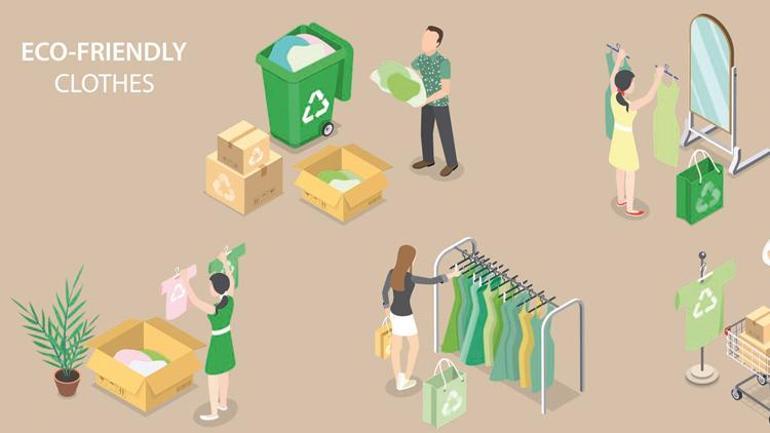Arzu CORPORATION
Created Date: November 25, 2024 04:00
The textile industry, whose sales were falling, found a new method to revive the activity in retail sales; Eco-labeled products, known as environmentally friendly products… While these products have become a new investment strategy for some brands, they have become a marketing tactic for others. These products, which must be produced using organic cotton and natural dyes, are sold under the ‘eco product label’ even though they are not produced in accordance with the necessary sensitivities. So what should consumers do? Experts on the subject told Hürriyet.
Sustainability has become a fact of life, regardless of sectors. The textile industry also got its share from the transformation experienced in every field. ‘Eco’ labeled products, known as ‘environmentally friendly products’, which are produced with environmentally friendly materials and production processes and received with long inspections, have begun to come to the fore in the industry. Organic cotton, bambooProduced with materials such as hemp, recycled polyester and natural dyes, these products cause less harm to nature and contain recyclable or biodegradable materials. Products produced in this way are sold with the ‘Ecological Environment Label’. Some companies that want to benefit from the increasing consumer interest in this field have turned this label into a marketing tactic to sell their products; It is stated that under the label of ‘eco product’ it both harms the nature and deceives the consumer.
IT SHOULD BE 10 PERCENT MORE EXPENSIVE BUT…
Industry representatives pointed out that the consumer should complain about the relevant company to the consumer protection departments regarding these products, which they stated were sold at more affordable prices, although they should have been 10 percent more expensive. Experts argue that consumer rights should be protected more strictly with a regulation in this context.
‘MARKETING TACTIC’
TOBB According to Şeref Fayat, President of the Apparel and Ready-made Clothing Industry Council, exporters have been carrying out sustainability processes thanks to the inspections of their customers for many years.
Explaining that the process has become much more sensitive, especially with the pandemic, Fayat said, “In developed countries, especially in Central and Northern Europe, 30 percent of the contain real information. Consumers are also aware of this. This rate goes down as the level of development decreases. Processes such as sustainability and respect for nature have now become a marketing technique used by many brands. “As demand for products increased, brands began to invest more in the field,” he said. Fayat said, “We can say that both the presentation and demand for sustainable products in the ready-made clothing industry in Turkey is 20 percent. As in many sectors, there may be people who manipulate here. Some consumers who are suspicious of the product send it to testing laboratories, but frankly, this is not an easy to understand situation. “It is a healthier process for the consumer to buy products from the brand he trusts,” he said.
‘AT THE INITIATIVE OF THE BRAND’
Explaining that an identity that reveals the traceability of a product has been created in this context, Ahmet Nakkaş, President of the Old Turkish Clothing Industry Association (TGSD), said: “Some countries apply sustainability criteria in their laws regarding the protection of consumer rights, while others do not. “Since there are no legal sanctions regarding sustainability in our laws, this is at the initiative of the brand,” he said. “Nakkaş points out that these criteria can be followed by law. “The inspections are carried out based on customer complaints. Chambers of commerce have consumer protection departments. If the product purchased is not realistic, customers can report their complaints there. “Complaints can be made online,” he said. Underlining that this issue is very sensitive and has a future, Nakkaş made the following assessment:
“We do not account for any extra costs in the inspections we carry out on our own products. Associations in Turkey should conduct statistical data research on this subject. These studies, which we call identity cards, are now being demanded by serious brands that are above world standards. As consumers, we don’t pay much attention to the we buy. “The consumer needs to be very conscious here.”
WHAT SHOULD CONSCIOUS CONSUMERS DO?
You should check whether the product corresponds to the instructions written on the product.
If the information provided does not match the product, a complaint should be made to the consumer protection committees.

‘IT IS UNDERSTAND FROM THE CERTIFICATES’
So, how will the consumer understand whether a product is truly an eco product?
In Turkey, having a sustainability audit done depends on the companies’ own initiative. The number of these internationally accredited testing and certification organizations and laboratories that examine the products is unknown. The leading international testing and certification organizations that carry out these inspections in Turkey are GOTS (Global Organic Textile Standard), OEKO-TEX® Standard 100, BSCI (Business Social Compliance Initiative), ISO 14001, Bureau Veritas, SGS, Intertek, TUV Rheinland. It is stated that consumers can understand whether eco-textile products are real or not by looking at the certificates on the label and the transparency of the brands. These and information help us understand whether the products are truly environmentally friendly. Information such as production process, packaging, price and quality, washing instructions are decisive.
Source: bigpara.hurriyet.com.tr


